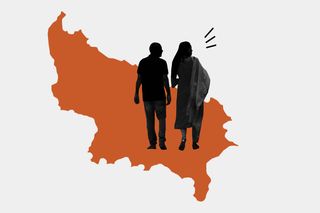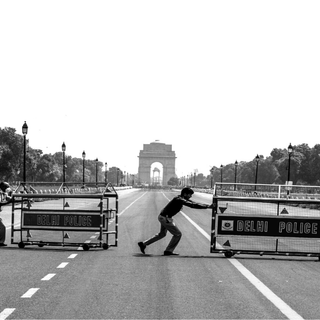
UP Police Investigation of ‘Love Jihad’ Concludes What We Already Know — It Doesn’t Exist
The myth of love jihad dates to the 1920s — but recent political and internet outrage over the made-up phenomenon proves India can’t shake its communalism.

Update: Since publication, the Uttar Pradesh government approved a draft ordinance to curb “forcible” or “dishonest” religious conversions. Under the new law, a marriage will be declared void if a woman converts to another religion in order to marry a man of her new faith. Women will be able to change their religion only after they’re married and must inform the district magistrate two months in advance so as to obtain permission to convert. Those in violation of the law will face a jail term of up to 10 years.
The Uttar Pradesh police’s investigation of ‘Love Jihad’ has revealed it’s not quite the problem it’s made out to be by right-wing ideologues and the media. Love jihad is an offensive term to describe the made-up phenomenon of Muslim men seducing and marrying Hindu women by subterfuge and coercion in order to increase the country’s Muslim population. The investigation, carried out at the behest of right-wing organizations including the Vishwa Hindu Parishad (VHP), involved a review of cases involving Hindu woman-Muslim man marriages submitted by all 22 police stations in Kanpur. Of these, The Wire reports that eight out of 14 cases involved consensual marriages. Another report by the Indian Express states that the police also ruled out any deliberate conspiracies and online funding set up to mass-convert Hindu women to Islam.
These reports stand in direct contrast to the necessity of a love jihad law, proposed by politicians and ministers of many states, who want to criminalize the non-existent practice. They also rubbish the love jihad-related outrage over Netflix’s A Suitable Boy, featuring an inter-religious couple kissing with a temple in the backdrop, and Tanishq’s wedding advertisement, featuringa young Hindu bride welcomed into a new home by her Muslim mother-in-law.
Love jihad, though a modern term, has been an unproven but unshakeable bogey since the 1920s. According to historian Charu Gupta, organizations like the Arya Samaj spread pamphlets full of propaganda regarding the Hindu woman victim and the Muslim man perpetrator. This was to further the notion of shuddhi, or re-converting Hindus who had chosen other religions back to Hinduism. Arya Samaj members believed it necessary to undertake shuddhi as a means for Hindus’ self-respect and determination because of the rapid increase in conversions from Hinduism to Islam/Christianity in pre-Independence India. This flurry of propaganda coincided with communal clashes in areas like Uttar Pradesh. In Muzaffarnagar in 1927, a mob gathered around a girl’s house after rumors spread regarding her marriage to a Muslim man and forced conversion to Islam. However, after the mob marched into the house to ensure ‘justice,’ it learned the girl in question had always been Muslim.
Related on The Swaddle:
Tell Me More: Talking Caste and Marriage With Jyotsna Siddarth, Founder of Project Anti‑Caste Love
In modern times, though right-wing idealogues stick to utilizing the Hindu woman’s body as their main battleground, the presence of Internet-influenced outrage culture and supplemental conspiracies like foreign funds make love jihad a stronger-than-ever bogey. Plus, the State’s and politicians’ tolerance and even encouragement for fake news and propaganda surrounding love jihad make it harder for the average individual to discern between fact and fiction. As Gupta writes in Hindu Women, Muslim Men: Love Jihad and Conversions, “the fact that such generalizations about Hindu women’s conversions due to ‘false’ love and marriages can now be made openly often legitimizes their public expressions and increases the threshold of public acceptance for them; this also makes them ‘true.’ Propagating such stories through pamphlets, meetings, rumors, and everyday conversations fed by them sustains this as an active cultural, and therefore, political issue.”
It remains the State and the judiciary’s responsibility to quell communal tensions spread by rumors. While progress on that front remains dim, considering many Indian lawmakers’ public attempts to legitimize love jihad by banning it, there is hope. The Allahabad High Court recently struck down an old judgment that said religious conversions for marriage were unacceptable, calling the same “bad in law.”
The judges involved noted, “We fail to understand that if the law permits two persons even of the same sex to live together peacefully then neither any individual nor a family nor even the state can have an objection to the relationship of two major individuals who out of their own free will are living together.”
Aditi Murti is a culture writer at The Swaddle. Previously, she worked as a freelance journalist focused on gender and cities. Find her on social media @aditimurti.
Related


Germany Requires Corporate Boards to Comprise 30% Women
